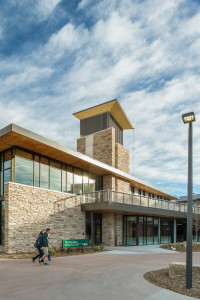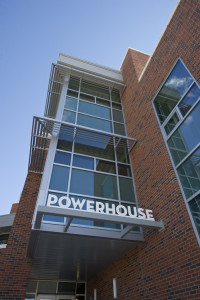Forget a blue streak. Colorado State University is on a green streak.
The U.S. Department of Education today honored CSU with one of its new Postsecondary Sustainability Awards through its Green Ribbons Schools program, which recognizes both public and private education institutions for “their exemplary efforts to reduce environmental impact and utility costs, promote better health, and ensure effective environmental education, including civics and green career pathways.”
The award marks the fourth time in a month CSU has been recognized by an independent organization for its sustainability efforts.
CSU’s green streak started in March when it became the first university ever to earn a platinum rating from the Sustainability Tracking, Assessment & Rating System – or STARS – an independent assessment that measures sustainability efforts at universities and colleges around the world.
Earlier this month, The Princeton Review ranked CSU 12th overall on its Top 50 Green Colleges List and fifth among public research universities in the country. In addition, one of the newest facilities on campus, the Pavilion at Laurel Village, achieved an LEED Platinum certification from the U.S. Green Building Council — a first for CSU.
“Being sustainable as a campus community is very closely tied to our land grant heritage,” said CSU President Tony Frank. “All of us on campus recognize our commitment to the day-to-day efforts that bolster sustainability across campus. These accolades from respected, independent organizations showcase to the public and future Rams our ongoing and long-term commitment to sustainability.”
Postsecondary Sustainability Award
CSU was one of nine colleges and universities honored by the Department of Education with a Postsecondary Sustainability Award, a new recognition for 2015. Until this year, only K-12 schools received federal Green Ribbon designation. CSU was nominated for the federal recognition by the Colorado Department of Education.
“It’s an honor to be recognized as one of the first recipients of this prestigious award,” said Tonie Miyamoto, co-chair of the President’s Sustainability Committee at CSU, which coordinates sustainability efforts across campus. “All of these awards are the reflection of all the hard work our faculty, staff and students have been doing for years.”
LEED Platinum certification
The Pavilion at Laurel Village features a host of sustainabilit y features, from a “living wall” of vegetation to an Eco Leaders office that offers advice on sustainable living to The Spoke, a bicycle education/maintenance shop.
y features, from a “living wall” of vegetation to an Eco Leaders office that offers advice on sustainable living to The Spoke, a bicycle education/maintenance shop.
In addition to having more than half of its building materials sourced regionally, it features water-efficient landscape and irrigation design, ultra high-efficiency plumbing and energy conservation measures including a katabatic tower.
More than 93 percent of the demolition and construction waste associated with the project was diverted from the landfill. A photo slideshow is available at www.csupavilion.com.
All of this helped the Pavilion earn a platinum rating from the LEED – which stands for Leadership in Energy and Environmental Design – program. There are 27,400 certified LEED commercial projects in the U.S. Of those, only 1,272 have been certified at platinum. In Colorado, there are 49 LEED Platinum commercial buildings.
Princeton Review ranking
Last year, the Princeton Review issued an “honor roll” of institutions that received a 99 – its highest sustainability score possible. CSU made that list, which only included 24 universities.
This time, the publication rated institutions based on:
- whether students have a campus quality of life that is both healthy and sustainable,
- how well a school is preparing students for employment in the clean-energy economy of the 21st century as well as for
 citizenship in a world now defined by environmental concerns and opportunities, and
citizenship in a world now defined by environmental concerns and opportunities, and - how environmentally responsible a school’s policies are.
Princeton Review used data from STARS as well as student surveys and institutions’ responses to questions about topics like the amount of local/organic food purchased, sustainable transportation practices, recent LEED-certified construction and waste-diversion rates to establish its Top 50 list.
It also asked institutions about their environmental studies programs, requirements to take coursework that has sustainability learning outcomes, mitigation of greenhouse gas emissions and percentage of energy used from renewable resources.
“It really goes hand in hand with our STARS Platinum rating, because the Princeton Review uses STARS data,” Miyamoto said. “And it’s not only the university’s efforts in these categories, but the impact of our students, as reflected in the student surveys.”
Jacob Kimiecik, director of the Student Sustainability Center at CSU’s School of Global Environmental Sustainability, said achieving 12th on the Princeton Review list is an honor and reflects the ongoing commitment from students and the University.
“From a student’s perspective, I think it is fantastic that we have received this recognition from the Princeton Review,” he said. “The work that students do and the culture that they have developed at CSU contribute significantly to this achievement and others like it.”
Kimiecik’s only caveat is that he believes CSU should be ranked higher.
“Just based on what I see occurring on a daily basis, we deserve to be placed even higher on this list,” he said.
STARS Platinum rating
In March, CSU became the first college or university to earn a platinum rating from STARS, a program run by the Association for the Advancement for Sustainability in Higher Education. Nearly 700 universities and colleges on six continents across the globe participate and are rated through the STARS system.
for the Advancement for Sustainability in Higher Education. Nearly 700 universities and colleges on six continents across the globe participate and are rated through the STARS system.
It marked the third time CSU achieved the highest scores of all universities in the STARS rating.
CSU earned high scores when it submitted its first report to STARS in 2011 and again in 2014. Both scores earned CSU a STARS Gold rating.
CSU received credit for a broad spectrum of initiatives including sustainability-related degree programs in all eight colleges, sustainability research in 90 percent of the academic departments on campus, more than a dozen sustainability immersion programs for students, and a wide range of alternative transportation options available to faculty, staff and students.
In addition, STARS identified CSU’s Adult Learner and Veterans Services office and its Energy Institute and Powerhouse Energy Campus as innovative programs.